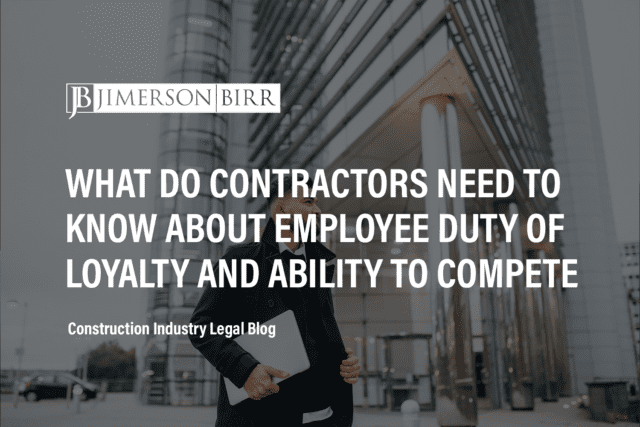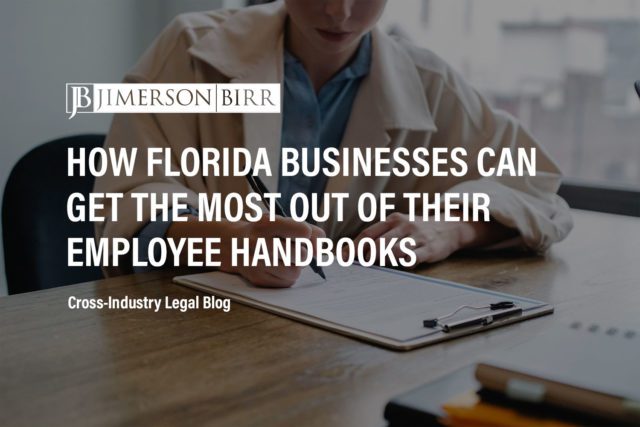What do facility closings and relocations encompass?
Facility closings and relocations are specific actions accompanying the broader process of shutting down or moving a business’s operations, which may involve terminating or transferring employees. In the context of Florida employment law, facility closings, and relocations can create various compliance and litigation issues, such as employee notification requirements and severance pay obligations.
For example, under federal law, the Worker Adjustment and Retraining Notification (WARN) Act mandates that employers with 100 or more employees provide 60 days’ advance notice of mass layoffs or facility closures. This requirement aims to give employees sufficient time to prepare for the change, find new employment, or enroll in retraining programs. In Florida, while there is no state-specific WARN Act, employers must still adhere to the federal law to ensure compliance and avoid potential litigation.
Need help with training, compliance, or litigation to protect your workplace? Schedule your consultation today with a top employment law attorney.
Which laws, rules, and regulations apply to facility closings and relocations?
Several Florida and federal laws, rules, and regulations apply to facility closings and relocations. Key regulations include:
- The WARN Act: As mentioned earlier, this federal law requires employers with 100 or more employees to provide 60 days’ advance notice of mass layoffs or facility closures.
- Fair Labor Standards Act (FLSA): This federal law governs minimum wage, overtime pay, and recordkeeping requirements. Employers must ensure compliance with FLSA provisions during the facility closing and relocation process, including paying out any outstanding wages and overtime owed to employees.
Florida employers can effectively manage facility closings and relocation processes by understanding and adhering to these laws, rules, and regulations while minimizing potential legal risks.
What common issues associated with facility closings and relocations lead to litigation against employers?
Facility closings and relocations can give rise to several legal risks that commonly lead to litigation between employees and employers:
- WARN Act Violations: Employers who fail to provide the required 60 days’ notice of facility closures or mass layoffs under the WARN Act may face legal action from affected employees.
- Unpaid wages and overtime: Employers must comply with the Fair Labor Standards Act (FLSA) and ensure that employees receive their due wages and overtime before a facility closes or relocates. Failure to do so can result in litigation.
- Discrimination: Employers must avoid discriminatory practices in selecting employees for layoffs or transfers during facility closings and relocations. Discrimination claims may arise under federal laws like Title VII of the Civil Rights Act of 1964 or state laws like the Florida Civil Rights Act.
What are the prerequisites to file a lawsuit regarding facility closings and relocations, and what legal defenses may employers assert?
To file a lawsuit regarding facility closing and relocations, employees must generally meet the following prerequisites:
- Exhaustion of Administrative Remedies: Employees must often first file complaints with administrative agencies like the Equal Employment Opportunity Commission (EEOC) or the Florida Commission on Human Relations (FCHR) before pursuing legal action.
- Timeliness: Employees must file complaints and lawsuits within the specified timeframes of relevant laws and regulations.
- Standing: Employees must demonstrate that they have suffered harm due to the employer’s actions and have a legal right to pursue a claim.
Employers may assert the following affirmative defenses in response to claims arising from facility closings and relocations:
- Compliance with the WARN Act: Employers can argue that they provided proper notice under the WARN Act or qualify for one of the exceptions to the notice requirement.
- Business Necessity: Employers can argue that their actions were based on a legitimate business need, not discriminatory or retaliatory.
By understanding these prerequisites and defenses, employees and employers can better navigate the legal landscape surrounding facility closings and relocations in Florida.
To determine whether your unique situation may necessitate litigation or another form of specialized advocacy, please contact our office to set up your initial consultation.
Frequently Asked Questions
Can an employee be terminated during a facility closing or relocation?
Yes, employees can be terminated if a facility closes or relocates. However, employers must comply with the WARN Act’s notice requirements and other applicable laws, such as anti-discrimination and wage and hour laws.
Are employees entitled to severance pay during a facility closing or relocation?
No federal or Florida state law requires employers to pay severance to employees affected by facility closing or relocation. However, employers must comply with the agreed-upon terms if an employment contract or collective bargaining agreement provides for severance pay.
What happens to employees’ benefits during a facility closing or relocation?
Employers must follow the terms of any applicable benefit plans, such as health insurance or retirement plans.
Have more questions about employment law compliance or litigation?
Crucially, this overview of facility closings and relocations does not begin to cover all the laws implicated by this issue or the factors that may compel the application of such laws. Every case is unique, and the laws can produce different outcomes depending on the individual circumstances.
Jimerson Birr attorneys guide our clients to help make informed decisions while ensuring their rights are respected and protected. Our lawyers are highly trained and experienced in the nuances of the law, so they can accurately interpret statutes and case law and holistically prepare individuals or companies for their legal endeavors. Through this intense personal investment and advocacy, our lawyers will help resolve the issue’s complicated legal problems efficiently and effectively.
Having a Jimerson Birr attorney on your side means securing a team of seasoned, multi-dimensional, cross-functional legal professionals. Whether it is a transaction, an operational issue, a regulatory challenge, or a contested legal predicament that may require court intervention, we remain tireless advocates at every step. Being a value-added law firm means putting the client at the forefront of everything we do. We use our experience to help our clients navigate even the most complex problems and come out the other side triumphant.
If you want to understand your case, the merits of your claim or defense, potential monetary awards, or the amount of exposure you face, you should speak with a qualified Jimerson Birr lawyer. Our experienced team of attorneys is here to help. Call Jimerson Birr at (904) 389-0050 or use the contact form to schedule a consultation.
Here are some blogs written by JB attorneys that provide more information about employment law:
- Independent Contractor or Employee: Know the Difference (jimersonfirm.com)
- Rescinding Job Offers in At-Will Employments in Florida | Jimerson Birr (jimersonfirm.com)
- Tips for Drafting Employee Handbooks in Florida | Jimerson Birr (jimersonfirm.com)
- Understanding The EEOC Process: Employee Sexual Harassment And Sexual Discrimination Claims In The Era Of #MeToo (jimersonfirm.com)
- Contesting OSHA Violations and OSHA Citations: A Guide To OSHA Employer Rights (jimersonfirm.com)
- What Do Contractors Need to Know About Employee Duty of Loyalty and Ability to Compete | Jimerson Birr (jimersonfirm.com)

We live by our 7 Superior Service Commitments
- Conferring Client-Defined Value
- Efficient and Cost-Effective
- Accessibility
- Delivering an Experience While Delivering Results
- Meaningful and Enduring Partnership
- Exceptional Communication Based Upon Listening
- Accountability to Goals











